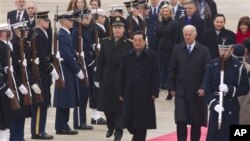Chinese President Hu Jintao arrives in Washington Tuesday for a two-day official visit, at a time when a growing number of Americans regard Asia to be to the most important region to the United States, according to new polling research released by the Pew Research Center.
When you talk with people in the nation's capital about U.S.-China relations, economic and trade ties are a frequently cited concern.
David, who works for the U.S. Army focusing on energy says it is important that President Hu is coming to Washington.
"You look at their economy, you look at how much we borrow from China and the control that China may or may not have over the United States because of the debt that we owe to them so I think it is important that [President Obama] is talking to them," he said.
Still, whether it's China's booming economy or growing military might, David says the U.S. needs to be cautious.
"I think that there are things that we should be concerned about, of course, definitely be concerned about and we have to be prudent in how we deal with China as they emerge and become more and more of a force on the global stage," he said.
Others note that the two countries need each other. Mabel Chu, an attorney in the U.S. capital, said "I think [the relationship] is full of tension at the moment, but I think the two countries need to work together because they have mutual interests."
According to a recent survey by the Pew Research Center, China's economic power is the biggest concern to Americans.
The survey says the American public wants President Barrack Obama to get tougher with China on trade and promote stronger ties.
Carroll Doherty of the Pew Research Center says the American public wants what seems to be conflicting things.
"They want it all essentially. They want to build a strong relationship, but they also want - they understand that China has a huge advantage in bilateral trade - and so they want the president to get tougher on trade. If he can achieve both of those objectives that would be ideal from the public's perspective."
With China's growing influence the importance of Asia is also on the rise. Asia, according to the survey, is the most important region in the world to Americans - a position previously held by Europe.
"In the [19]90s the public was still looking mostly to Europe, now Asia is seen as more important and I think that that's just reflective of global reality. I think that's just a sense of the rise of China, perhaps not just China, but the importance of Korea and other Asian countries," said Doherty.
Many of the survey respondents saw China as the biggest threat to the United States, followed close behind by North Korea and Iran. But, when questioned more closely, they said they saw China as as a serious problem - not an outright adversary.
David Haney, who is from the western state of Oregon says China is not a country to be feared in the traditional militaristic sense.
"I think we need to be good friends, I think we need to work on it. I think it's an awkward thing given the style of government [in China] along with their capitalist approach to economy so it's an interesting thing to follow, you know. It certainly isn't like the days of Mao. But I think we should extend a hand and do everything we can to be good friends of theirs and likewise," he said.
Which is what Mr. Hu and Mr. Obama are expected to do when the two hold a series of meetings on Wednesday and President Hu is treated to the first White House state dinner for China in more than a decade.




